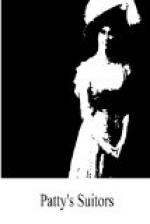“That’s just right!” and Patty, as the victorious party, could afford to be generous. “Now run away, Kit. You promised your aunt you’d scoot when her guests arrived.”
“Yes, I did, Princess, so off I go! I haven’t told you yet what I think of your cleverness in this matter,—by the way, how did you get on to it?”
“I’ll tell you some other time; run away, now.”
So Kit went away, and Patty turned back to the laughing group who were merrily discussing the joke.
Mrs. Homer and Marie were so horrified when they learned of their narrow escape from trouble, and so gratified that through Patty it had been an escape, that their feelings were decidedly mixed.
Beatrice was by nature what is called a good loser, and she took her defeat gaily.
“I had thought,” she said, “that Kit and I were the best practical jokers in the world; but we’ve been beaten by Patty Fairfield! Now, that you’re all here, I’m really glad of it, but I did think it would be fun to see mother and Marie hopping around, waiting for you!”
Then they all went out to luncheon, and among the pretty table decorations and merry first of April jests, Patty managed to smuggle in at Bee’s place a funny little figure. It was a bauble doll dressed like a Jester or Court Fool. And he bore a tiny flag in his hand, bearing the legend, April first.
“I am an April Fool!” Beatrice admitted, as she took her seat, “but I forgive Patty for making me one, if all of the rest of you will forgive me.”
Bee made this apology so prettily, and her roguish dark eyes flashed so brightly, that forgiveness was freely bestowed, and indeed, as one of the guests remarked, there was nothing to forgive.
But the story was told over and over again, and Patty was beset with questions as to how she chanced to discover the fraud.
“Why, I just happened to,” she said, smiling; “I think I’m a detective by instinct; but there’s not much credit due to me, for I knew Beatrice and Mr. Cameron were always planning jokes, and I couldn’t believe they’d let the first of April pass by without some special demonstration. So I kept my eyes open,—and I couldn’t help seeing what I did see.”
“You’re a Seer from Seeville,” declared Bee, “and I promise I shall never try to trick you again.”
“Which means,” said Patty, calmly, “that you’ll never cease trying until you accomplish it, and you say that to put me off my guard.”
The baffled look on Bee’s face proved that this was true, and everybody laughed.
It was that very same evening that Kenneth came to call, and Patty merrily told him the whole story.
She was not much surprised that he disapproved heartily of the joke.
“It isn’t nice, Patty,” he declared; “I may be dull and serious-minded, but I can’t stand for jokes of that sort.”
“I either, Ken,” Patty returned; “but we must remember that people in this world have different ideas and tastes. And especially, they have differing notions of what constitutes humour. So, just because we don’t like practical jokes, we oughtn’t to condemn those who do. We may like some things that they don’t approve.”




